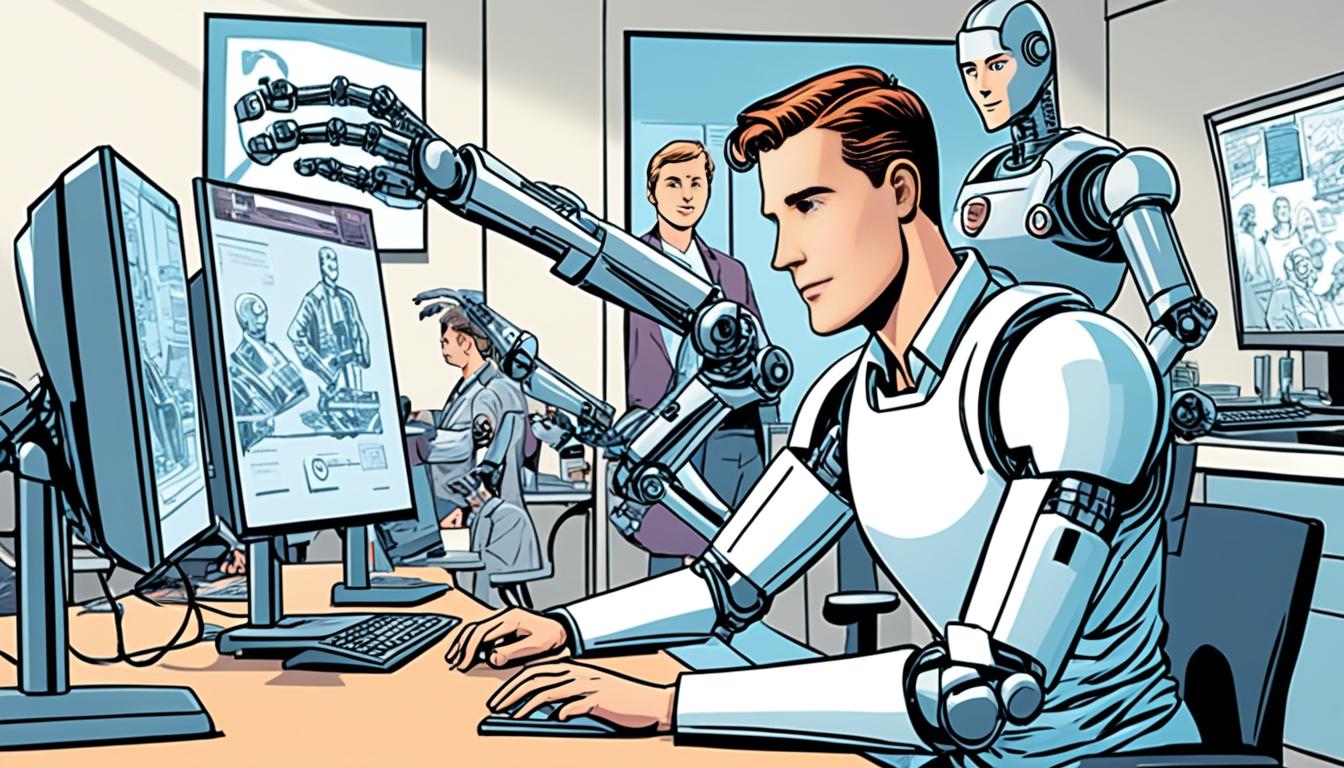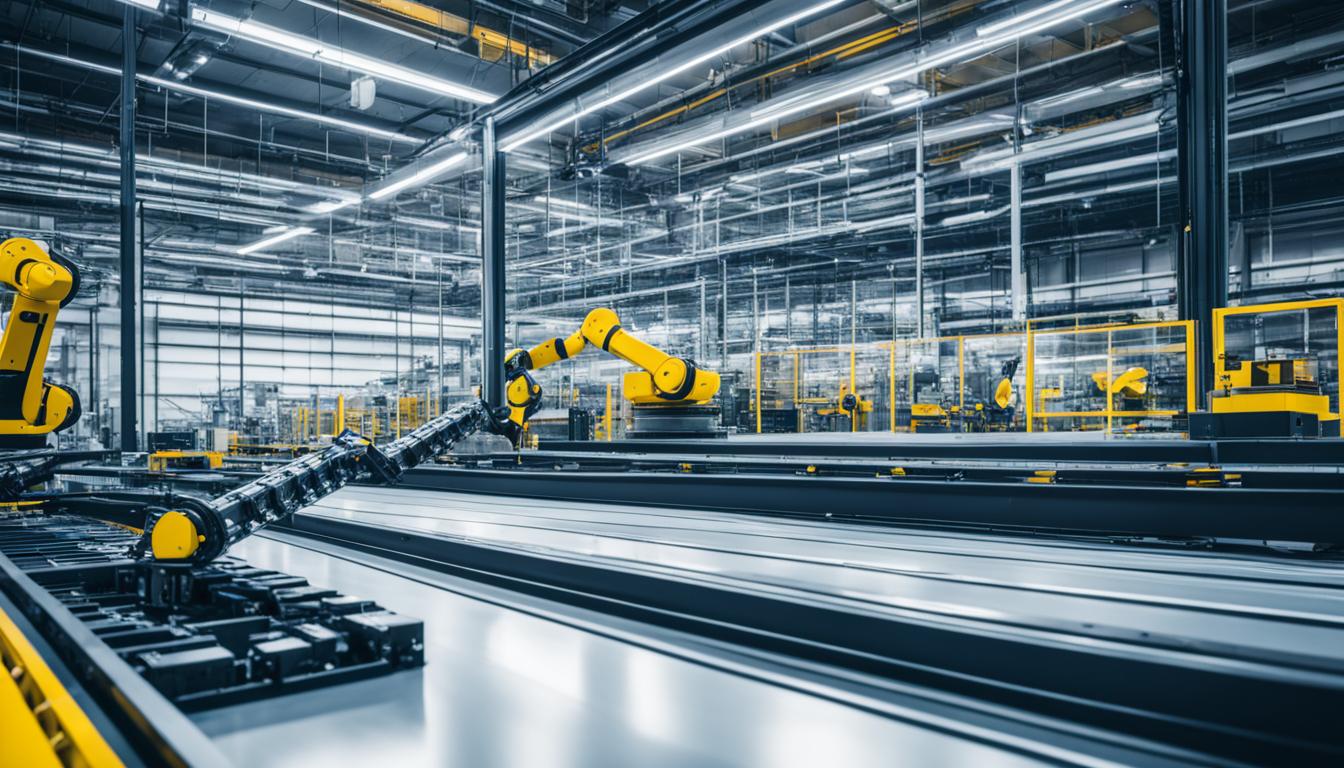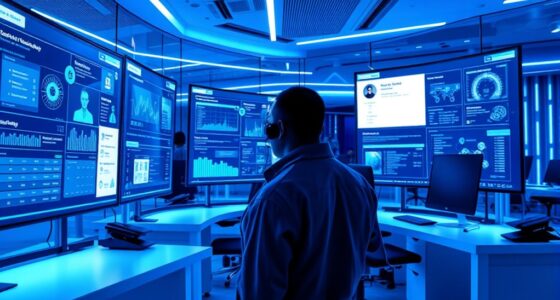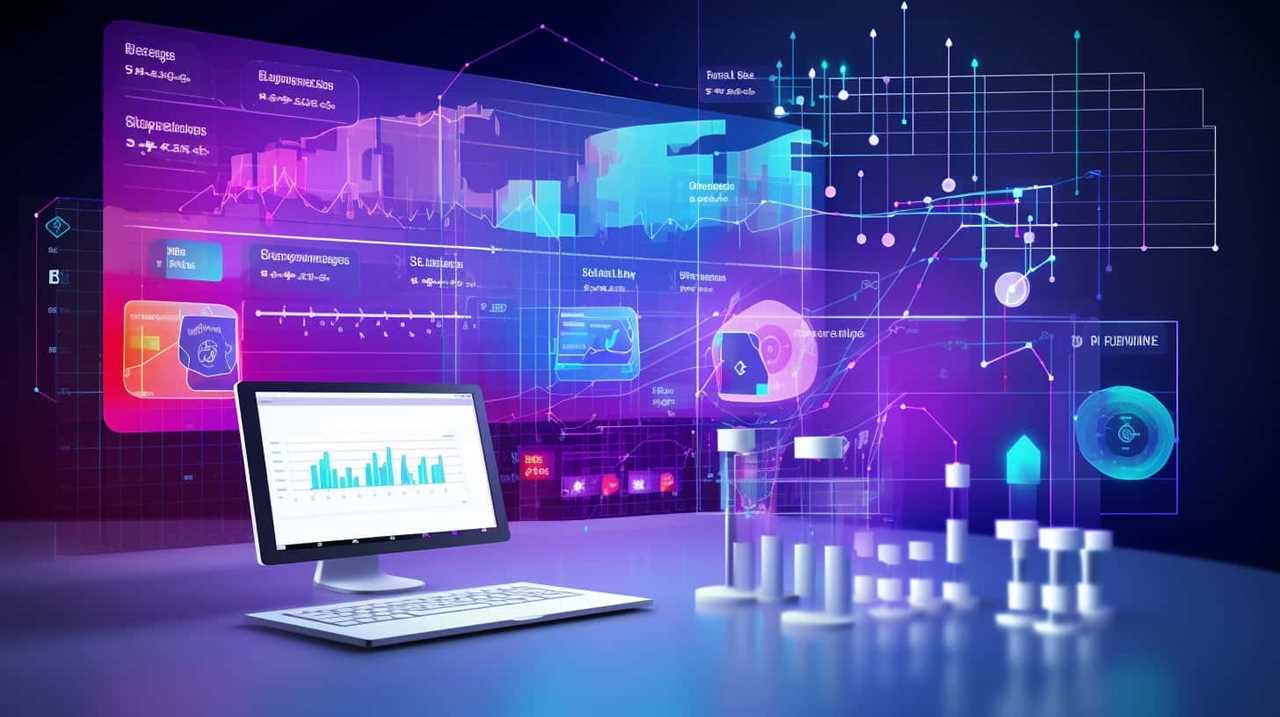Did you know that artificial intelligence (AI) could potentially contribute around $13 trillion to the global economy by the year 2030? This remarkable estimate, as revealed by the McKinsey Global Institute, highlights the substantial impact AI is expected to have on both the job market and the overall economy.
Key Takeaways:
- AI has the potential to bring about significant changes in the job market and global economy.
- While there are concerns about job displacement, AI also creates new job opportunities and enhances productivity.
- Workers must upskill and adapt to the evolving job market to remain competitive.
- Businesses must embrace AI technologies and prioritize training and development programs.
- Collaborative efforts between policymakers, businesses, and workers are necessary to ensure a smooth transition and maximize the benefits of AI for the workforce and society as a whole.
AI and Job Displacement
According to a report by investment bank Goldman Sachs, the rise of artificial intelligence (AI) has sparked concerns about job displacement. The report suggests that AI could potentially replace the equivalent of 300 million full-time jobs, leaving many workers at risk. It is estimated that a quarter of work tasks in the United States and Europe could be automated by AI, leading to potential job loss in various industries.
However, it is important to note that AI is not solely a threat to employment. In fact, AI has the potential to create new job opportunities and enhance productivity. The increased use of AI technologies has the potential to increase the total annual value of goods and services produced globally by 7%, leading to economic growth and improved living standards.
While some jobs may be more susceptible to displacement than others, it is crucial to remember that AI can also have a positive impact on employment. AI technologies can automate repetitive and mundane tasks, allowing workers to focus on higher-value and more fulfilling work. Additionally, AI can lead to the creation of new roles and industries, requiring individuals to develop new skills and adapt to the evolving job market.
It is important for workers to stay informed about the effects of AI on employment and proactively prepare for potential changes. By upskilling and acquiring new knowledge in emerging fields, individuals can position themselves for success in the AI-driven job market. Furthermore, businesses should invest in retraining and reskilling programs to ensure a smooth transition and equip their employees with the necessary skills to thrive in the changing landscape.
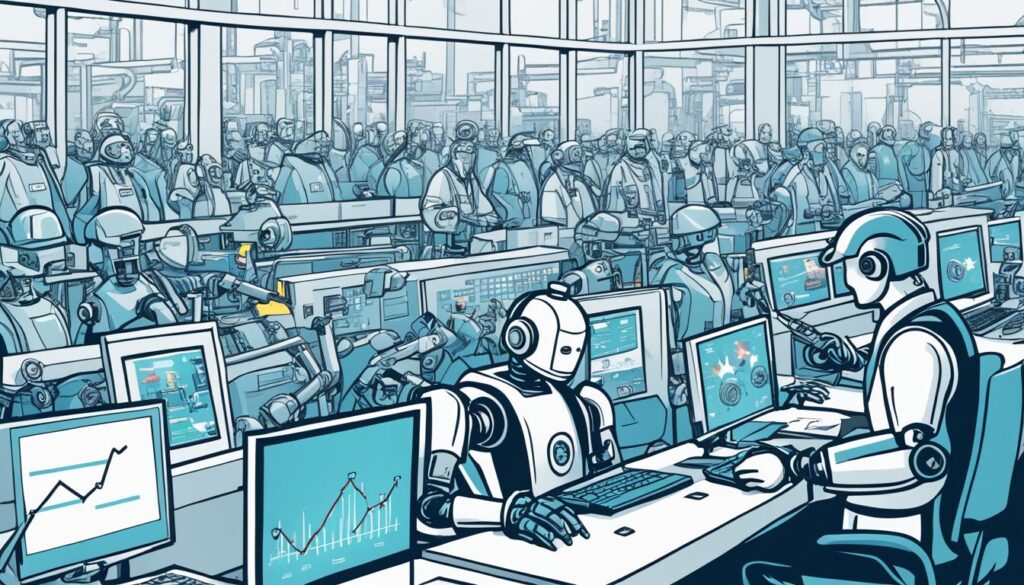
While job displacement due to AI is a legitimate concern, it is crucial to approach the topic with a balanced perspective. AI has the potential to transform industries, increase efficiency, and create new opportunities. By embracing AI technologies and adapting to the changing job market, we can navigate the challenges and reap the benefits of this technological revolution.
Industries Most at Risk of Automation
When it comes to the impact of workforce automation and robotics on the job market, certain industries are particularly vulnerable. These industries include manufacturing, transportation, and customer service, where repetitive and predictable work can be easily automated. The rise of robots replacing jobs in these sectors has become a significant concern for workers.
However, it’s important to note that automation effects on employment are not limited to these industries alone. Other sectors, such as finance, healthcare, and education, have also embraced AI technologies to enhance human decision-making and improve customer experiences. In these industries, automation is not about replacing jobs, but rather about empowering workers and enabling them to focus on more complex tasks.
Let’s take a closer look at these industries:
Manufacturing
The manufacturing industry has long been at the forefront of automation and robotics. Repetitive assembly line work, such as product assembly and quality control, can be efficiently carried out by machines. Automation in manufacturing has led to increased productivity and cost savings, but it has also resulted in job loss for some workers.
Transportation
In the transportation industry, advancements in autonomous vehicles and drone technologies are reshaping the job market. Delivery services, truck driving, and even piloting aircraft are areas that are seeing the potential for significant automation. While these technological advancements offer efficiency and safety benefits, they also raise concerns about job displacement.
Customer Service
Customer service is another sector that is being impacted by automation. Chatbots and virtual assistants are increasingly being used to handle customer inquiries and provide support. While these AI-powered solutions can enhance efficiency and responsiveness, they also raise concerns about the loss of human connection in customer interactions.
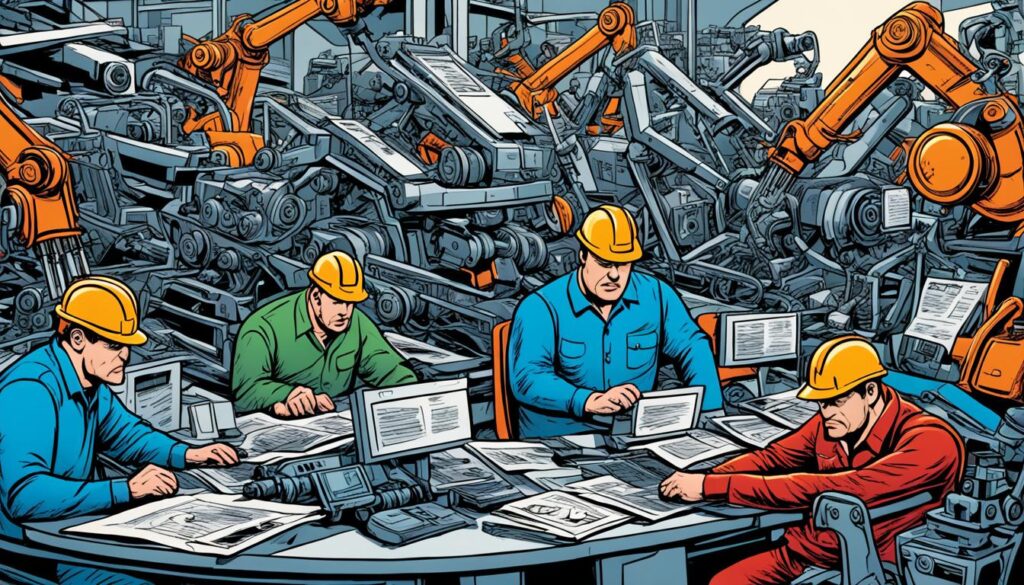
Despite these risks, it’s essential for workers in these industries to adapt to the changing job market. Continuous upskilling and staying up-to-date with technological advancements are crucial to remaining competitive. Workers can focus on acquiring skills that are complementary to AI technologies, such as problem-solving, critical thinking, and creativity.
| Industry | Automation Risk |
|---|---|
| Manufacturing | High |
| Transportation | Medium |
| Customer Service | Low |
| Finance | Low |
| Healthcare | Medium |
| Education | Low |
As industries continue to evolve and adapt to automation, it’s important to strike a balance between leveraging technology for efficiency and preserving the human element in the workforce. The collaboration between humans and machines can lead to better outcomes and enable industries to thrive in the era of automation.
The Rise of AI-based Technologies and Their Impact on Job Creation
AI-based technologies, such as natural language processing and computer vision, are revolutionizing the job market by creating new roles such as data analysts, machine learning engineers, and AI ethicists. These technologies enhance human capabilities and drive innovation in industries such as healthcare, finance, and education.
To excel in these new roles, individuals must possess a blend of technical and soft skills. Technical skills in areas such as programming, data analysis, and machine learning are essential for working with AI technologies. Soft skills such as communication, critical thinking, and creativity are equally important for collaborating with cross-functional teams and adapting to changing business needs.
AI-based technologies are not meant to replace human workers but rather to augment their abilities and streamline processes. By automating repetitive tasks and providing data-driven insights, AI enables individuals to focus on more value-added work that requires human judgment and creativity.
As AI continues to evolve, there is a growing demand for skilled professionals who can harness the power of these technologies and drive innovation in their respective industries. Job opportunities in AI-dominated industries are on the rise, and individuals with the right skill set can embark on rewarding careers.
Job Opportunities in AI-Dominated Industries:
- Data Analysts: Professionals who can analyze and interpret complex data sets to derive actionable insights and drive informed decision-making.
- Machine Learning Engineers: Experts in developing and implementing machine learning algorithms that enable AI systems to learn and improve over time.
- AI Ethicists: Specialists who ensure the responsible and ethical use of AI technologies, addressing potential biases and potential societal implications.
These are just a few examples of the diverse job opportunities available in AI-dominated industries. As businesses across various sectors increasingly adopt AI, the demand for skilled professionals in these roles will only continue to grow.
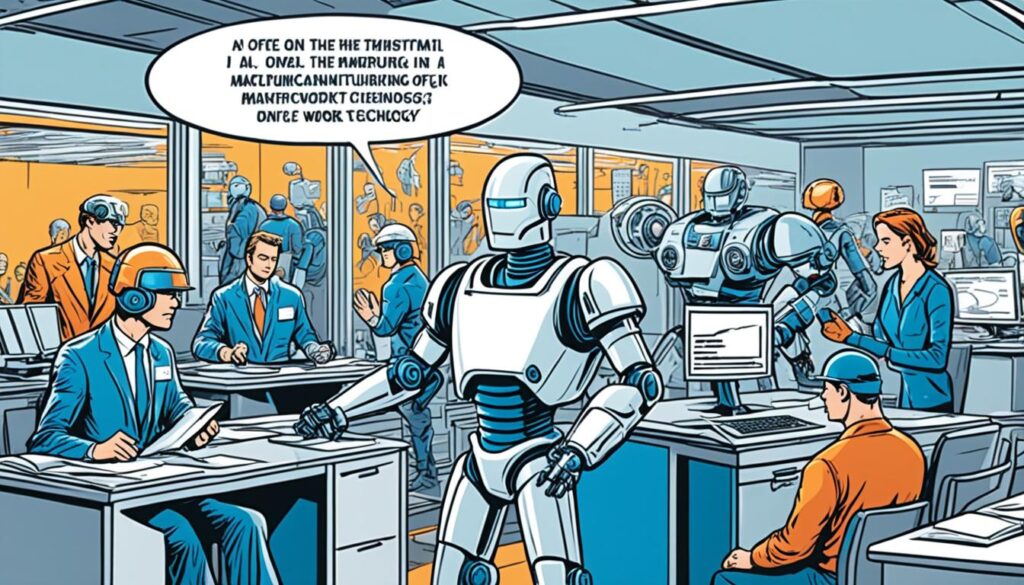
Embracing AI-based technologies is crucial for businesses to remain competitive in today’s rapidly evolving landscape. Organizations that adapt and leverage AI have the potential to enhance productivity, drive innovation, and unlock new business opportunities.
However, it is equally important for individuals to upskill and reskill themselves to thrive in the AI-driven job market. Continuous learning, staying updated with the latest advancements in AI, and acquiring the necessary skills will enable individuals to seize the job opportunities offered by AI-based technologies.
Upskilling and Reskilling for the AI-driven Job Market
With the rise of AI, upskilling and reskilling are crucial for workers to remain competitive in the job market. The rapid advancements in technology, particularly in the field of artificial intelligence, are changing the employment landscape and creating both challenges and opportunities.
To thrive in an AI-driven economy, individuals need to develop a combination of technical and soft skills. Technical skills, such as data analysis, machine learning, and programming, are highly sought after in industries influenced by AI. Completing online courses, gaining work experience, and participating in relevant training programs can help individuals acquire these skills and remain ahead of the curve.
However, it is equally important to develop soft skills that complement technical expertise. Effective communication, critical thinking, problem-solving, and adaptability are key attributes that can make individuals valuable assets in the AI-driven job market. These skills enable workers to collaborate, lead, and navigate the changing work environments effectively.
“In today’s evolving job market, it’s essential for individuals to continuously update their skills and adapt to emerging technologies. By embracing upskilling and reskilling opportunities, we can capitalize on the job prospects in the age of AI and ensure our long-term employability.”
In addition to individual efforts, companies and organizations play a critical role in facilitating upskilling and reskilling initiatives. Providing training programs and certifications in AI-related fields can equip employees with the necessary skills to succeed in a rapidly changing work environment.
Moreover, fostering a culture of continuous learning within organizations encourages employees to stay updated with the latest technological advancements and industry trends. This not only enhances their job prospects but also contributes to organizational growth and innovation.
Key benefits of upskilling and reskilling in the AI-driven job market:
- Increased employability and job prospects in AI-dominated industries
- Improved ability to adapt to technological advancements
- Enhanced productivity and efficiency in the workplace
- Opportunities for career advancement and growth
Upskilling and Reskilling Programs: Examples
| Organization | Programs Offered | Skills Developed |
|---|---|---|
| Google Cloud Certification | Data analysis, machine learning, cloud computing | |
| IBM | IBM SkillsBuild | Artificial intelligence, cybersecurity, blockchain |
| Microsoft | Microsoft AI Academy | Machine learning, natural language processing, computer vision |
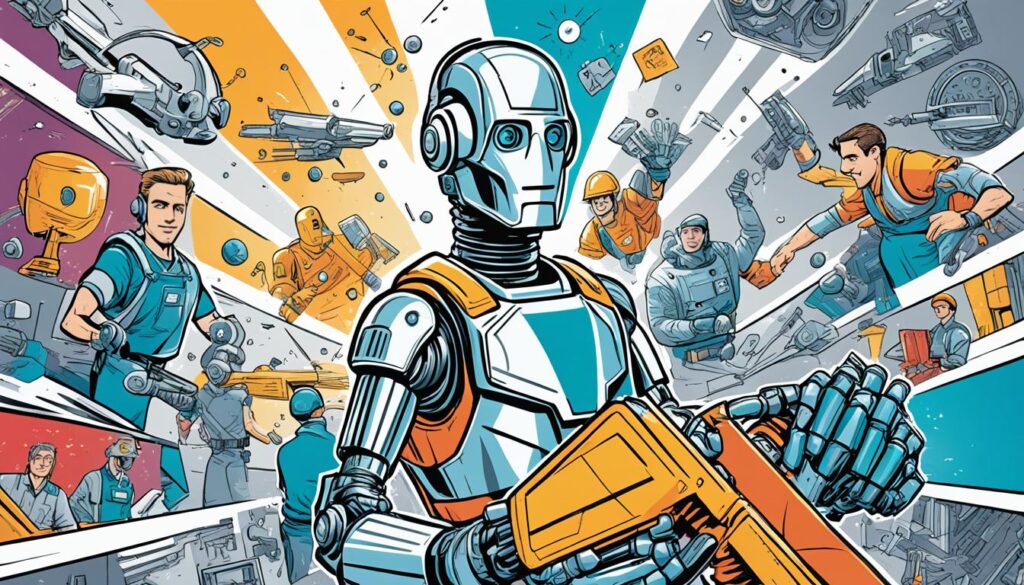
Importance of Soft Skills in the AI-driven Job Market
While technical skills are crucial in an AI-driven job market, soft skills such as communication, empathy, and creativity are equally important.
Effective communication is essential for collaborating with colleagues, clients, and customers. As AI becomes more integrated into the workplace, the ability to clearly convey ideas and information will set individuals apart.
Empathy plays a significant role in understanding and relating to others, which enhances not only customer experiences but also workplace dynamics. With AI, the human touch and emotional intelligence are highly valued.
Creativity and innovative thinking are highly sought-after skills in an AI-driven economy. As AI takes care of routine tasks, individuals who can think outside the box and find unique solutions will thrive.
Developing a blend of technical and soft skills is key to success in the evolving job market. As AI continues to shape employment trends, individuals who possess a strong combination of technical expertise, effective communication, empathy, and creativity will be well-equipped for the opportunities and challenges that lie ahead.
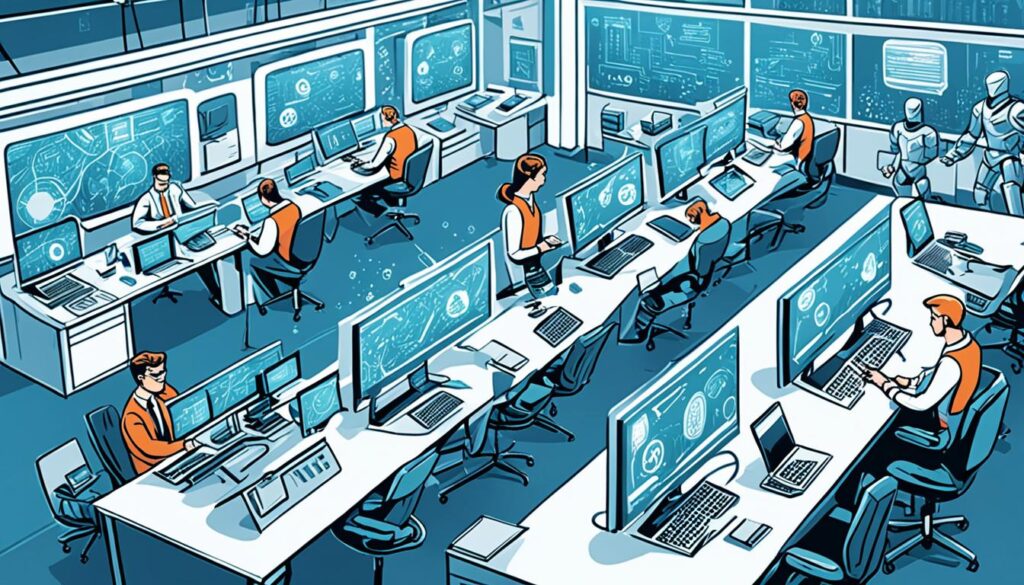
Examples of Soft Skills in an AI-driven Job Market
| Soft Skills | Description |
|---|---|
| Communication | The ability to effectively convey ideas and information. |
| Empathy | Understanding and relating to others. |
| Creativity | Thinking outside the box and finding innovative solutions. |
The Future of Work and AI Relationship
The future of work is intricately connected to the relationship between AI and human workers. As AI continues to advance, it has the potential to automate routine tasks and streamline processes, allowing humans to focus on more creative and strategic work. This transformative shift in the workplace will shape the future of work in the age of AI.
One of the key benefits of AI is its ability to automate repetitive and mundane tasks, freeing up valuable time for workers to engage in higher-value work. With AI handling routine responsibilities, employees can devote their attention to more complex and intellectually stimulating tasks that require critical thinking, problem-solving, and decision-making skills. This shift in responsibilities will lead to a workforce that is more efficient and productive.
Furthermore, AI can enhance decision-making processes by analyzing vast amounts of data, identifying patterns, and providing valuable insights. By leveraging AI-powered analytics, businesses can make more informed decisions, improve operational efficiency, and drive innovation. Human workers, armed with these AI-driven insights, can then contribute their expertise and creativity to strategizing, problem-solving, and driving business growth.

In addition to task automation and enhanced decision-making, emerging trends such as automation, the gig economy, and remote work are reshaping the workforce. Automation, enabled by AI, is transforming industries and job roles, requiring workers to adapt and acquire new skills to remain valuable in the evolving job market. The gig economy, fueled by digital platforms and AI-enabled matching algorithms, is providing opportunities for flexible work arrangements. And with the advancements in remote work technologies, location is no longer a barrier, allowing businesses to tap into a global talent pool.
To navigate the future of work in the age of AI, policymakers, businesses, and workers need to be proactive in embracing these changes. It is essential to invest in training and upskilling programs that equip workers with the necessary technical and soft skills to thrive in an AI-driven economy. Businesses must foster a culture that embraces innovation and collaboration between humans and AI technologies. Policymakers need to create favorable regulations and policies that support workforce transformation and ensure an inclusive and sustainable future of work.
AI’s Impact on High-skilled Jobs
Artificial Intelligence (AI) has the potential to revolutionize high-skilled jobs by automating mundane tasks and enhancing decision-making processes. With its advanced capabilities, AI can mitigate human biases and improve overall work quality. While there are concerns about job displacement, it is essential to note that AI will not only render certain jobs obsolete but also redefine existing roles and create new job opportunities.
By automating repetitive and time-consuming tasks, AI allows high-skilled professionals to focus on more strategic and creative work. This shift enables individuals to utilize their expertise and problem-solving abilities more effectively. As a result, the overall efficiency and productivity of the workforce can significantly improve, leading to better outcomes and innovation.
However, to succeed in the AI-driven job market, individuals and businesses must embrace AI technologies and adapt to the changing landscape. Professionals in high-skilled jobs need to acquire new skills and knowledge to leverage AI effectively. Upskilling and reskilling initiatives play a crucial role in preparing individuals for the AI revolution.
While technological unemployment may arise in certain areas, it is important to recognize that AI also generates new employment opportunities. Industries such as data analysis, machine learning engineering, and AI ethics are thriving, offering diverse and rewarding careers. The key lies in exploring these emerging fields and acquiring the necessary skills to meet the demands of an AI-dominated job market.
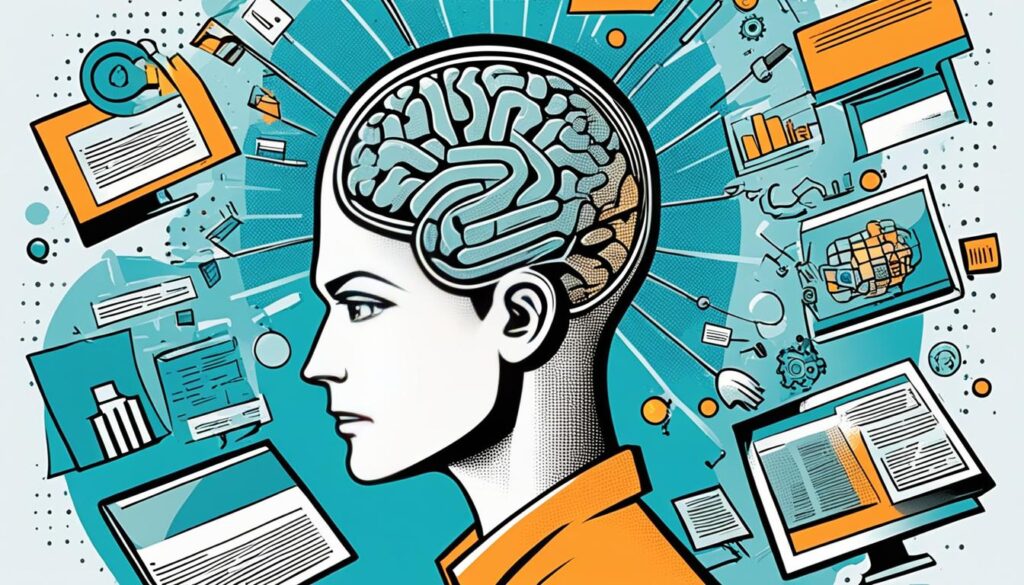
In summary, the impact of AI on high-skilled jobs is significant and multifaceted. As AI continues to advance, professionals must proactively adapt and continuously learn to stay relevant in their respective fields. The collaboration between humans and AI technologies can create a more efficient and productive workforce, leading to transformative advancements and a brighter future of work.
Conclusion
In conclusion, the impact of AI on the workforce is significant, with both positive and negative implications. While there are concerns about job displacement due to automation, it is important to recognize that AI also brings new job opportunities and enhances productivity in various industries.
To navigate the evolving job market, workers must upskill and adapt to the changing technological landscape. Continuous learning and development of technical and soft skills are crucial for remaining competitive in an AI-driven economy.
Businesses play a critical role in embracing AI technologies and prioritizing training and development programs. Collaboration between policymakers, businesses, and workers is essential to ensure a smooth transition and maximize the benefits of AI for both the workforce and society as a whole.
FAQ
What is the impact of AI on employment?
AI has the potential to both automate certain jobs and create new job opportunities. While some jobs may be at risk of displacement, AI is also expected to enhance productivity and drive innovation, leading to economic growth and the creation of new roles.
Will AI lead to job displacement?
AI has the potential to automate certain tasks, which may result in the displacement of some jobs. However, it is important to note that AI can also lead to the creation of new jobs and the redefinition of existing roles. Workers need to adapt and upskill to remain competitive in the evolving job market.
Which industries are most at risk of automation?
Industries that involve repetitive and predictable work, such as manufacturing, transportation, and customer service, are at the highest risk of automation. However, other industries, such as finance, healthcare, and education, also embrace AI technologies to enhance decision-making and customer experiences.
How does AI impact job creation?
AI-based technologies, such as natural language processing and computer vision, have the potential to create new job opportunities. Roles such as data analysts, machine learning engineers, and AI ethicists are emerging in industries like healthcare, finance, and education. These technologies enhance human capabilities and drive innovation.
How can individuals thrive in the AI-driven job market?
Upskilling and reskilling are crucial for individuals to remain competitive in the job market. Developing technical skills, completing online courses, gaining work experience, and developing soft skills are essential for success in an AI-driven economy. It is important to adapt to technological advancements and prioritize continuous learning.
What is the importance of soft skills in the AI-driven job market?
While technical skills are crucial, soft skills such as communication, empathy, and creativity are equally important. Effective communication allows for collaboration, empathy enhances customer experiences and workplace dynamics, and creativity fosters innovation. A blend of technical and soft skills is key to success in the evolving job market.
How will AI reshape the future of work?
The relationship between AI and human workers will shape the future of work. AI has the potential to automate routine tasks and enhance human decision-making processes, allowing humans to focus on more creative and strategic work. The emerging trends in automation, the gig economy, and remote work are transforming the workplace.
What impact will AI have on high-skilled jobs?
AI has the potential to revolutionize high-skilled jobs by automating mundane tasks and enhancing decision-making processes. While some jobs may become obsolete, others will be redefined, and new job opportunities will emerge. Individuals and businesses must embrace AI technologies and adapt to the changing job market.
